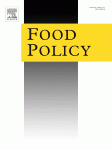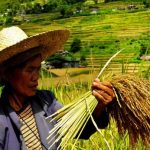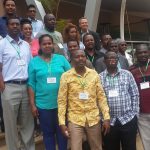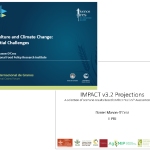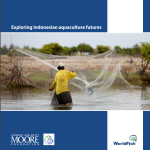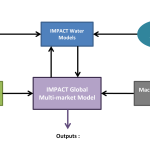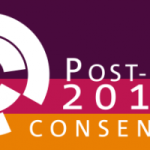By Keith Wiebe, IFPRI Rapidly expanding global trade in the past three decades has lifted millions of people out of poverty. But trade has also reduced manufacturing wages in high income countries and made entire industries uncompetitive in some communities, giving rise to nationalist politics that seek to stop or reverse further trade expansion in the >> Read more
Improved modeling of rice under environmental stresses
By Tao Li & Samarendu Mohanty, IRRI The worldwide usage of and increasing citations for ORYZA2000 has established it as a robust and reliable ecophysiological model for predicting the growth and yield of rice in an irrigated lowland ecosystem. Because of its focus on irrigated lowlands, its computation ability is limited in the representation of the effects >> Read more
Crop and bio-economic modeling for an uncertain climate
By Gideon Kruseman (CIMMYT) The potential impact of climate change on agriculture and the complexity of possible adaptation responses require the application of new research methods and tools to develop adequate strategies. At a recent five-day training workshop titled “Crop and Bio-economic Modeling under Uncertain Climate,” scientists applied crop and bio-economic models to estimate biophysical >> Read more
To Latin America for Global Connections
By Daniel Mason-D’Croz (IFPRI) Argentinian Counterparts In early December, Daniel Mason-D’Croz presented at the second annual International Conference on Agro-Industrial Projections hosted by INAI (www.inai.org.ar, www.inai.org.ar/notas.asp?id=193) in Buenos Aires, Argentina. This is the second year that Daniel has presented at the conference and is a part of building collaboration with the economic modeling team at INAI. >> Read more
IFPRI and partners share insights on climate change and food security in Paris
“Up and down the scales of time and place: Integrating global trends and local decisions to make the world more food-secure by 2050” at Global Landscapes Forum, December 5 2015.
Exploring Indonesian aquaculture futures: new report from WorldFish
By Nhuong Tran (WorldFish), Evgeniya Anisimova (PIM) Aquaculture is the fastest-growing food production sector globally, with production projected to double within the next 15–20 years. Future growth of aquaculture is essential to providing sustainable supplies of fish in national, regional and global fish food systems; creating jobs; and maintaining fish at affordable levels for resource-poor consumers. To ensure >> Read more
IFPRI’s IMPACT model update: a core component of GFSF’s quantitative foresight modeling.
In this latest update, the IMPACT model was designed to incorporate not only better agricultural data but also best practices in model structure and coding.
IFPRI Discussion Paper on Promising Technologies
by Shahnila Islam (IFPRI) IFPRI, in collaboration with Global Futures and Strategic Foresight (GFSF) team members from CIAT, CIMMYT, CIP, ICRISAT, and IRRI has released a discussion paper titled “Climate Change Adaption in Agriculture: Ex Ante Analysis of Promising and Alternative Crop Technologies using DSSAT and IMPACT”. The paper reports results from Phase 1 of >> Read more
Post 2015 Consensus: Analysis on the benefits of infrastructure and technology investments on post-harvest loss reduction
By Daniel Mason-D'Croz (IFPRI) Achieving food security sustainably is a major challenge that will require continued efforts on increasing agricultural productivity. However, some of the gains in increased productivity may not be realized due to post-harvest losses (losses experienced between the field and the consumer). Estimates on the magnitude of post-harvest losses range greatly depending >> Read more
WorldFish hosts Fish IMPACT model training workshop targeted at ASEAN countries, Penang, Malaysia, Aug 25-29, 2015
By Nhuong Tran (WorldFish) The Global Futures and Strategic Foresight Program (GSFS) held a training workshop on the IMPACT Fish model at WorldFish headquarters in Penang from Aug 25-29, 2015. Five participants attended, including staff from WorldFish and partner institutions in Vietnam, Indonesia, and Bangladesh. The purpose of the training workshop was to deliver the >> Read more
